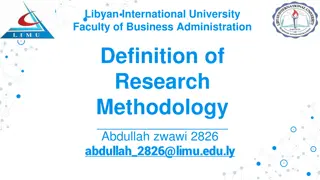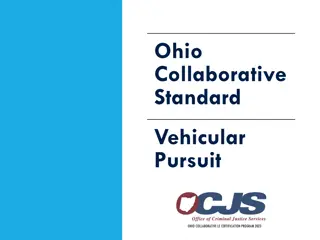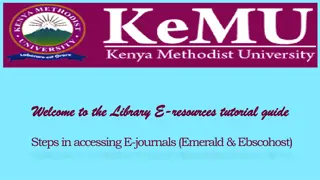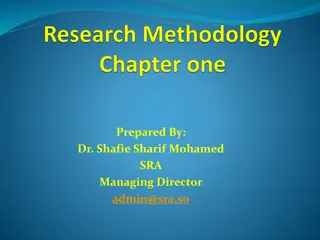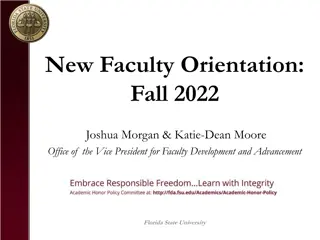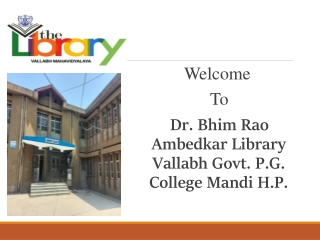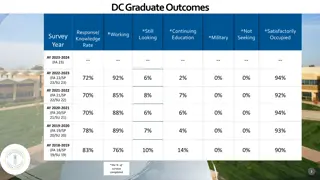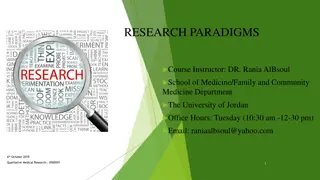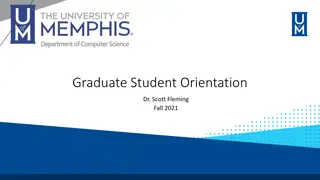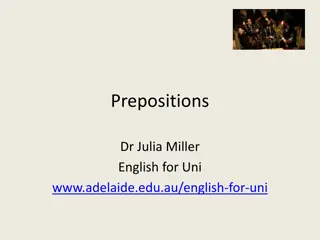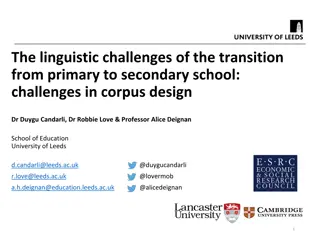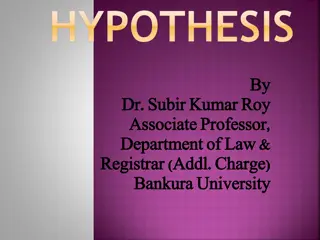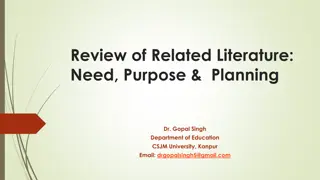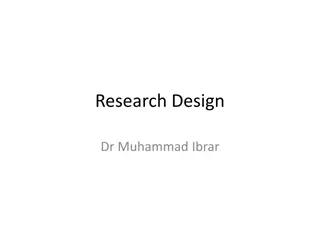Understanding the Essence of Research in Academic Pursuits
Research, a systematic exploration to establish principles and policies, involves a scientific and patient study to search for knowledge and new facts in various fields. It encompasses defining problems, formulating hypotheses, collecting and evaluating data, and testing conclusions to contribute to the advancement of knowledge.
Download Presentation

Please find below an Image/Link to download the presentation.
The content on the website is provided AS IS for your information and personal use only. It may not be sold, licensed, or shared on other websites without obtaining consent from the author. Download presentation by click this link. If you encounter any issues during the download, it is possible that the publisher has removed the file from their server.
E N D
Presentation Transcript
Introduction to Research COMPILED By Dr. V. S. Pawar-Patil M.A., M. Phil., Ph. D., NET Asst. Professor, Dept. of Geography, The New College, Kolhapur
Introduction to Research Introduction Research: The word research is composed of two syllables Re and Search . Re is the prefix meaning Again or over again or a new and Search is the latter meaning to examine closely and carefully or to test and try . Together they form, a careful, systematic, patient study and investigation in some field of knowledge undertaken to establish principles / policies.
Introduction to Research Meaning of Research Research is refers to Search for Knowledge. Scientific & systematic search on a specific topic. It is an art of scientific investigation Research is careful investigation or inquiry specially through search for new facts in any branch of knowledge. The manipulation of things, concepts or symbols for the purpose of generalizing to extend, correct or verify knowledge, whether that knowledge through objective and systematic method of finding solution to a problem is research. D. Slesinger & M. Stephon
Research can also be defined as.. Search for knowledge Systematic and scientific search for getting relevant answers on any taken up specific topic. Scientific enquiry into a subject. Research is a movement from the unknown to the known. It is the voyage of discovery
Definition Of Research Research is primarily committed to establishing systematic, reliable and valid knowledge about the social world. (Bulmer) According To Clifford Woody, Research comprises Defining and redefining problems. Formulating hypothesis (basic idea) Collecting Organizing Evaluating data Making decisions Suggesting solutions Reaching conclusions Finally, carefully testing the conclusions To determine whether they fit the formulated Hypothesis Research comprises of
Definition Of Research Research is thus an original contribution to the existing stock of knowledge making for its advancement, in short the search for knowledge through objective and systematic method of finding solution to a problem. The term research refers to the systematic method consisting of enunciating the problem, formulating a hypothesis, collecting the facts or data, analyzing the facts and reaching certain conclusion.
What is research? Research means finding answers to the questions. It is a systematic search for truth. Through research, new and original information, ideas about the world we live in, are obtained. Research is search for knowledge. Research is defined as a scientific and systematic search for information on a specific topic.
Funding Curiosity Quality of Life Utility of Applications Advancement of Technology Amount of knowledge Application Development Applied Research Basic Research 6
Objectives Of Research 1. To gain familiarity with a phenomenon or to achieve new insight into it. 2. To portray accurately the characteristics of a particular individual, situation or a group. 3. To determine the frequency with which something occurs or with which it is associated with something else. 4. To test a hypothesis of a causal relationship between variables.
Major Types of Research Descriptive Research Analytical Research Applied Research Basic Research Quantitative Research Qualitative Research Conceptual Research Non-Scientific Methods
Descriptive Research Surveys and fact finding enquiries of different kinds Purpose is the description of the state of affairs as it exists in present Ex Post Facto Research Researcher has no control over the variables; he can only report what has happened or what is happening
Subdivisions of Descriptive Research Survey Research The Case Study Correlational Study Comparative Study
Analytical Research Involves in-depth study and evaluation information in an attempt to explain complex phenomenon of available The researcher has to use facts or information already available and analyze these to make a critical evaluation of the material
Subdivisions of Analytical Research Historical Research Philosophical Research Review Research synthesis (meta analysis i.e. analysis of the review already published)
Applied / Action Research Finding a solution to an immediate problem Research aimed to find social or political trends that may affect a particular institution is an example of applied research Subtypes Marketing Research Evaluation Research
Basic / Pure / Fundamental Research Concerned with generalizations and with the formulations of a theory Natural phenomenon and mathematics are examples of basic research Finding information that has a broad base of application
Quantitative Research Based on measurement of quantity or amount Weighing, measuring quantitative research are examples of
Qualitative Research Phenomena relating to quality or kind Character, personality and mankind are examples of variables used to measure qualitative research Word association test, sentence completion test
Conceptual / Experimental Research Related to some abstract idea or theory To develop new concepts or to reinterpret existing ones Attempt to establish cause and effect relationship
Unscientific Methods of Problem Solving Tenacity Cling to certain beliefs despite lack of evidence Superstitions; eg: Black cat brings bad luck Intuition Considered to be common sense / self evident; may be found to be false Authority Reference to authority used as a source of knowledge
The Rationalistic Method Derive knowledge through reasoning Basketball players are tall. Haresh is a basketball player. Therefore, Haresh is tall. The Empirical Method Describes data or a study that is based on objective observation Relies on observation or experience, capable of being verified by experiment
Other Types of Research Based on Time Cross Sectional Research Longitudinal Research Based on Environment Field Research Laboratory Research Clinical or Diagnostic Research Case study or in-depth approaches
Exploratory Research Hypothesis development, rather than hypothesis testing Formalized Research Substantial structure and with specific hypothesis to be tested
Historical Research Utilize historical sources to study events of the past Conclusion oriented Picking a problem, redesign enquiry, conceptualize Decision oriented For the need for a decision maker, researcher cannot embark upon research his own inclination e.g.: Operations Research
Your attention is desired Research Approach: An Overview
Research Approach: Concept Plans and the procedure for research that span the steps from broad assumptions to detailed methods of data collection, analysis, and interpretation. should be used to study a topic. Informing this decision should be the philosophical assumptions the researcher brings to the study; procedures of inquiry (called research designs); and specific research methods of data collection, analysis, and interpretation. The overall decision involves which approach
Components of Research Approach Philosophical Worldviews Research Methods Design
A basic set of Beliefs that guide Actions source: Guba, 1990,p.17, cited in Creswell, 2014, P.6 Post positivism Constructivism Determination Reductionism Empirical observation and measurement Theory verification Understanding Multiple participant meanings Social and historical construction Theory generation Transformative Pragmatism Political Power and justice oriented Collaborative Change-oriented Consequences of actions Problem-centered Pluralistic Real-world practice oriented
Quantitative and Quantitative Research
Three Approaches of research designs Qualitative research exploring and understanding the meaning individuals or groups ascribe to a social or human problem. Quantitative research testing objective theories by examining the relationship among variables. Mixed methods research an approach to inquiry that combines or associates both qualitative and quantitative forms. 32
Qualitative vs. quantitative research Qualitative Research Quantitative Research Criteria Purpose To understand & interpret social interactions. To test hypotheses, look at cause & effect, & make predictions. Larger & randomly selected. Group Studied Smaller & not randomly selected. Study of the whole, not variables. Words, images, or objects. Variables Specific variables studied Type of Data Collected Form of Data Collected Numbers and statistics. Qualitative data such as open- ended responses, interviews, participant observations, field notes, & reflections. Quantitative data based on precise measurements using structured & validated data- collection instruments. 33
Qualitative vs. quantitative research Criteria Qualitative Research Quantitative Research Type of Data Analysis Identify patterns, features, themes. Identify statistical relationships. Objectivity and Subjectivity Subjectivity is expected. Objectivity is critical. Role of Researcher Researcher & their biases may be known to participants in the study, & participant characteristics may be known to the researcher. Researcher & their biases are not known to participants in the study, & participant characteristics are deliberately hidden from the researcher (double blind studies). Generalizable findings that can be applied to other populations. Results Particular or specialized findings that is less generalizable. Scientific Method Exploratory or bottom up: the researcher generates a new hypothesis and theory from the data collected. Confirmatory or top-down: the researcher tests the hypothesis and theory with the data. 34
How methods can be mixed Types of mixing Comments Two types of research question. One fitting a quantitative approach and the other qualitative. The manner in which the research questions are developed. Preplanned (quantitative) versus participatory/emergent (qualitative). Two types of sampling procedure. Probability versus purposive. Two types of data collection procedures. Surveys (quantitative) versus focus groups (qualitative). Two types of data analysis. Numerical versus textual (or visual). Two types of data analysis. Statistical versus thematic. Two types of conclusions. Objective versus subjective interpretations. 35
RESEARCH METHODS Vs. RESEARCH METHODOLOGY Research Methods:- Refers to the methods/ techniques researchers use in performing research operations. Research Methodology:- It may be understood as a science of studying how research is done scientifically. In it we study the various steps that are generally adopted by researcher in studying his research problem along with the logic behind them.
Difference between Methods and Techniques TYPE METHODS TECHNIQUES Library Research (i)Analysis of historical records (ii)Analysis of documents Recording of notes, Contents analysis, Tape and listening and analysis. Statistical compilation and manipulations, references and abstract guides, contents analysis. 2. Field Research (i) Non-participant direct observation (ii) participant observation (iii) Mass observation (iv) Mail questionnaire (v) Opinionnaire (vi) Personal interview (vii) Focused interview (ix) Telephone survey (x) Case study and life history Observational behavioral scales, use of score cards, etc.Interactional recording possible use of tape recorders, photo graphic techniques.Recording mass behaviour, interview using independent observers in public placesIdentification of social and economic background of respondentsUse of attitude scales, projective techniques, use of sociometric scales.Interviewer uses a detailed schedule with open and closed questionsInterviewer focuses attention upon a given experience and its effectsUsed as a survey technique for information and for discerning opinion may also be used as a follow up of questionnaireCross sectional collection of data for intensive analysis, longitudinal collection of data of intensive character 3. Laboratory Research Small groups study of random behavior, play and role analysis Small groups study of random behavior, play and role analysis


